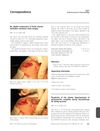Search
for
Sort by
Research
780-810 / 1000+ results
research Alopecia Areata: An Autoimmune Disease Causing Hair Loss
Alopecia Areata is an autoimmune condition causing hair loss with no cure and treatments that often don't work well.

research Alopecia Areata Update
Half of people with Alopecia Areata may see hair regrowth within a year without treatment, but recovery is unpredictable.

research Anatomy and Physiology of the Skin
The skin's layers protect, sense, and regulate the body's internal balance, but can be prone to cancer.

research Prostaglandin-Induced Hair Growth
Latanoprost can make eyelashes longer, thicker, and darker.

research Clinical Aspects and Spectrum of Illness of Toxic Shock Syndrome: Overview
Toxic Shock Syndrome progresses quickly, often involves multiple organs, and is linked to Staphylococcus aureus toxins, with treatment options available but diagnostic challenges remaining.

research Inherited Ichthyosis: Syndromic Forms
Understanding the genetics of rare inherited ichthyosis syndromes is key for better treatments and genetic counseling.

research Trichoscopy Tips
Trichoscopy is a useful tool for diagnosing hair and scalp issues, but doctors must be careful to avoid mistakes.

research Immunology of Alopecia Areata
Alopecia areata, a type of hair loss, is likely an autoimmune disease with a genetic link, but its exact cause is still unknown.

research Male Frontal Fibrosing Alopecia with Generalized Hair Loss
A 66-year-old man with a rare case of male frontal fibrosing alopecia did not regrow hair despite treatment.

research Metabolic Disorders And Hair Growth
Hair can indicate early signs of metabolic disorders, with issues like protein deficiency stopping hair growth.

research The Function and Structure of the Skin
The skin protects the body, regulates temperature, senses touch, and makes vitamin D.

research Evaluation of Animal Models Suitable for Hair Research and Regeneration
Animal models, especially mice, are essential for advancing hair loss research and treatment.

research Radium Poisoning
Radium exposure causes severe health issues, so strict safety measures are essential.

research Resolution of Plantar Hyperkeratosis of Pachyonychia Congenita During Chemotherapy for Ewing Sarcoma
Chemotherapy improved a girl's painful foot condition linked to pachyonychia congenita.

research Female Hair Loss: Assessment, Categorization, and Management
The document concludes that diagnosing female hair loss requires careful examination, with treatments varying by condition and psychological support often necessary.

research Hair Biology and Nutritional Influences
Eating a balanced diet with the right vitamins and minerals is important for healthy hair, but too many supplements can be harmful.

research Alopecia and Thyroid Disease
Thyroid disease can cause hair loss and treating thyroid problems might help with hair disorders.

research Self-Portrait as Self-Evaluation and Follow-Up of Androgenetic Alopecia: A Case Study
Auto-portraits help evaluate scalp hair.

research The Hair Follicle as a Dynamic Mini-Organ
Hair follicles are complex, dynamic mini-organs that help us understand cell growth, death, migration, and differentiation, as well as tissue regeneration and tumor biology.

research Epidemiology, Diagnosis, and Management of Hirsutism: A Consensus Statement by the Androgen Excess and Polycystic Ovary Syndrome Society
Experts recommend using evidence-based methods to diagnose and treat hirsutism, focusing on symptoms and underlying causes.

research Clinical Manifestations of Toxic Shock Syndrome
Toxic Shock Syndrome mainly affects menstruating women, can recur, and is linked to staph bacteria, with rapid treatment being crucial.

research Histopathologic Evaluation of Alopecias
The document concludes that accurate diagnosis of different types of hair loss requires careful examination of hair and scalp tissue, considering both clinical and microscopic features.

research Telogen Effluvium: A Review of Acute and Chronic Forms
Chronic Telogen Effluvium may resolve after years and is diagnosed by examining the patient's history and clinical signs, with treatment aimed at underlying causes and possibly minoxidil.

research Drug-Associated Alopecia
Some drugs can cause hair loss, and stopping these drugs often leads to hair regrowth.

research A Nationwide Outbreak of Alopecia Associated With the Use of a Hair-Relaxing Formulation
A hair-straightening product caused widespread hair loss and scalp injuries, mainly affecting African American women.

research Dermatologic Manifestations of Human Immunodeficiency Virus Infection
HIV can cause unusual and severe skin problems that are hard to treat.

research Congenital Hair Loss Disorders: Rare, But Not Too Rare
Some hair loss disorders are caused by genetic mutations affecting hair growth.

research Anatomy and Function of the Skin
The skin is the largest organ, protecting the body, regulating temperature, and producing hormones.

research Morphological Approach to Hair Disorders
Accurate clinical, histological, and genetic methods are key for understanding and treating hair disorders.